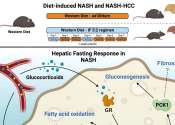Tiny change has big effects, reverses prediabetes in mice
A small chemical change—shifting the position of two hydrogen atoms—makes the difference between mice that are healthy and mice with insulin resistance and fatty liver, major risk factors for diabetes and heart disease. ...
Jul 4, 2019
0
4









